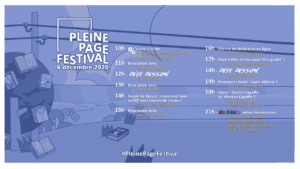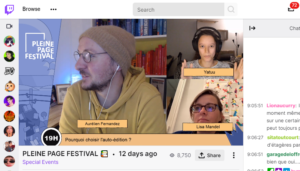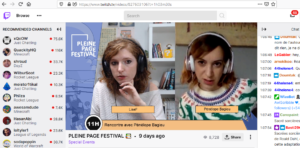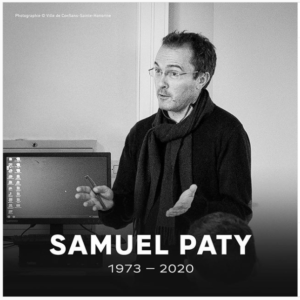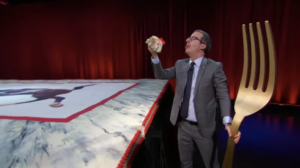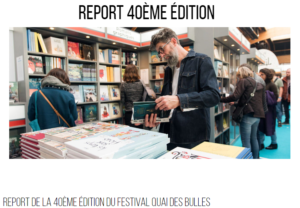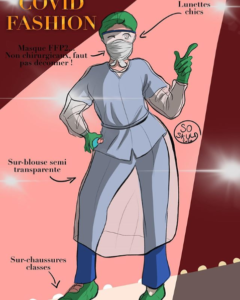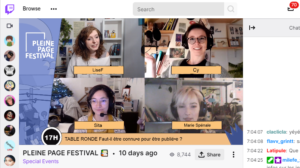
Heya. If you read yesterday’s blogiversary victory lap, you know that I read some emails out of order, and thus on Monday we had Fleen Senior French Correspondent Pierre Lebeaupin’s recap of Pénélope Bagieu’s interview, but not the initial framing post about the online festival it was a part of. We’re continuing today with highlights from the festival, and we’ll run a summary post with the overview later rather than try to insert it in the past. I mean, if I’ve got the ability to go back and do things in the past I’m not wasting that on fixing a blog post sequence error, not when there’s Powerball jackpots to win. We at Fleen, as always, than FSFCPL for his ceaseless efforts to bring us the news of bandes dessiné3ss web.
_______________
The panel was titled Is Being Known A Prerequisite To Being Published?, and began with introductions: in particular Marie Spénale is known for Heidi In Spring and Wonder Pony, and Cy for Real Sex From Real Life, Radium Girls, etc.
[Festival host]Lise: Do they think being known is a prerequisite to being published?
Spénale: No, she wasn’t know at the time of Heidi so she veers towards no: the prerequisite to her is building a file for the project to present to a publisher, no need for subscribers, as far as she can tell.
Lise: So could being known influence the process?
Spénale: It can be brought up as a strength point, a bonus, so it can be useful, but not a prerequisite.
Cy: It can be a double-edged sword; first, she agrees that it is not a prerequisite, subscribers mean nothing when it comes to sales in the end. And when she submitted the file she built for Radium Girls, her editor when forwarding to the publisher mentioned she made YouTube videos, to which the the latter allegedly reacted Ah, another book from a female YouTuber. In the end he opened the file and the project was made, but it could have started better.
Spénale: She once was introduced in an article as blogger Marie Spénale, which may not necessarily be flattering.
Lise: As for Sita, she started making a name for herself with her YouTube channel, then Instagram account; did that help getting to make webtoons?
Sita: No, it can help, be brought up to strengthen the case, but what’s really important is knowing the field and having the right contacts. The contacts she made when she made YouTube videos in turn led to knowing the editors and publishers to contact.
Lise: All three of them have an Instagram account, does a creator have to have one?
Cy: Have to would be presumptuous; there are no hard rules, each creator can employ different means. She no longer has any portfolio proper, as Instagram has taken up that role for her, more specifically her Instagram feed (as opposed to stories, which she uses for food pictures, etc.)
Sita: She has two accounts, one for drawings and one for book reviews. It takes a lot of time to do right, as well as energy, so it must be accounted for rather than put all your energy to it to the detriment of working on your files, universes, etc. It did earn her commissions, some of them for communication campaigns.
Spénale: She sees her Instagram account more as a display window for readers than as a professional tool.
Lise: And all three also have a YouTube channel, why?
Sita: That originally was for book reviews, everyone had a blog already and she felt it was the right time to get into YouTube; then for her own drawings on top of that. She wanted to create things she appreciated herself, and be able to better reach English-speaking audiences. Oh, and receive book recommendations herself. At the time she did not intend to create books, she had only begun to get back into drawing and was a developer by trade, creation only came later.
Cy: She was getting tired of answering always the same questions, so the intent was being able to send a link for an answer; her first video was on crayons. Then she started publishing speed drawing videos, captured using an iPad in suspension. It can be a versatile medium, with many possible formats, so she published animated GIF, vlogs, explanations for the general public, ad debunking, etc. Community management is a job in itself, so it can take time. She’s having fun, if that weren’t the case she’d stop. There is something of a disdain towards YouTube creators, such as EnjoyPhoenix even though it requires a significant skillset. At some point making a comic book was in fashion with YouTubers, and not all of it was good, as would be the case for any such category in accordance with Sturgeon’s Law, but the negative branding of YouTuber comic book remained.
Sita: Which intersects with the disdain towards comics for children and licensed comics.
Spénale: The main interest for her was experimenting, in particular with longform content which she couldn’t do as well on the blog she already had. Then she worked on her Instagram with short formats, if not instant. She’d like to go back to longform, but it takes time.
Cy: It does take a lot of headspace, and must be done as a batch, instead of answers which can be done as bite-sized work items as questions come.
Spénale: Yes, it does take a lot of time; she did it on the influence of Cy. She did have to invest on it when Wonder Pony, meant for children, was to be released: the publisher hardly promoted it, so she had to take that into her own hands.
Lise: What about Twitch, then?
Cy: She was already a consumer of Twitch livestreams, such as Boulet’s, and opened hers on the prodding of Gauvain Manhattan (who since stopped doing so). She has done a lot of them in the last two years; it allowed her to survive when doing Radium Girls because she’s a hermit, and draws traditionally which means she has to work on her drawing table, so streaming allowed her to exchange with people. It allowed her to have feedback on her work. Now she sometimes feels up to it, sometimes not: it requires some concentration for instance. She does it with her mobile phone using the Twitch app. At the beginning she was uploading with her 4G connection and had to closely watch her credit, now it’s OK.
Sita: Same, she started hitting the ground running, this summer, she wanted to livestream as a fundraiser for BLM/George Floyd, she had no hardware and had to improvise. She appreciated the Twitch community and kept doing so with her phone used as a webcam which wasn’t great, but she kept doing so in the same way so as to survive during the tunnel where she is doing nothing else but draw and starts hating it. And obviously, she never streams client work.
Spénale: Not yet, she has all the necessary hardware, obviously she wouldn’t stream client work either. But wouldn’t spoilers be an issue?
Cy: On the other hand, it would be hard to spoil Radium Girls [Author’s Note: a book telling the story of women who painted clock figures with radium-laced paint so these would be visible in the dark. Without any precaution to speak of]. Anyway, the speech bubbles are done later, and in the end the plates are done over such a long stretch of time that it would be hard to follow that way, not to mention she’s only ever had 80 viewers maximum.
Spénale: So yes, one of these days, though YouTube does consume a lot of her time already.
Lise: So Twitch is more of a community building tool than a portfolio, as Instagram on the other hand appears to be?
Cy: Maybe, but also a very selfish one, it allows a more intimate bubble than Twitter, YouTube, or Instagram allow. There is indeed more of a community feeling, of direct feedback: she feels less on a pedestal to her viewers there. Though of course pests exist there too.
Sita: Artist Twitch is different from the remainder of Twitch, especially in the French-speaking sphere where this is still niche.
Lise: Does it take time away from the job?
Cy: Oh yes.
Spénale: it does take time, but is it time away from her job as a creator? It’s a leisure activity in the end, as if she’d taken up pottery.
Sita: She creates a Webtoon, on a platform which is not really a publisher, so she does a bit of her own outreach, and uses Instagram for that: she schedules posts as a community manager would. And she did a whole campaign when her work came out.
Cy: It is part of the background of her work, and couldn’t tell how much time it takes her. There is no community management to speak of when publishing a comic book in the French-Belgian tradition, and she isn’t paid for that part of the work. She does not fault her publisher for Radium Girls, but for Real Sex From Real Life she invested in her social networks, which amounts to unpaid work. So it’s disheartening when there is no online followup when a comic book comes out.
Spénale: She did start her own channel to make up for the shortcomings of her publisher, so being known was a double-edged sword: her publisher was expecting her to come up with content for promotion on her Instagram, even though that is not her job, fundamentally.
Cy: She got Why don’t you put it on your Instagram? for commission work. And the same goes for some media outlets: when she gets begged to retweet e.g. interviews of her, then who’s promoting whom, exactly?
Spénale: There is the more general issue of not all books being well-supported marketing-wise, because of the general strategy to flood the market, so publishers tend to offload that to the creator if they are known.
Lise: So creators need to do their own communication and community management?
Sita: it’s a role we add to our activities if we are already present on social networks. Some creators are content not doing any of that and more power to them.
Cy: It depends on more than social network activity, even for those already “famous” there: the reader demographics matter a lot. So for books targeting the 12-30 years old range, of course it matters, but readers of history-based comic books are not reachable through social networks. Of course for Real Sex From Real Life the social networks were squarely the target market. Don’t expect an Instagram account to be the key to fame: it’s frustrating and you end up begging for reshares. Nothing happens in a day: she has been on Instagram for 10 years, and found her public there.
Spénale: The matter of the pubic reached is interesting, we do bring a certain public, for instance when signing she sees young women who are less traditionally present on festivals.
Cy: When she signed in a very cool library led by three women, they were impressed: You got women coming to signings!” Cy: Don’t they read comics? Them: Yes, but they don’t come to signings.
Spénale: There is an interest in shifting the balance of power with publishers, it brings new points to the table, she can point to her own community and tell she doesn’t need them as much as she would if she didn’t have it.
Sita: Which is why she wanted to publish on the web first. It’s hard to get published, unless you’re willing to accept pathetic terms, having a public bring some weight when negotiating.
Lise: Does Cy agree?
Cy: She agrees, but it has to be made into a strength, to be brought up on the negotiating table: I bet as much on you as you do on me, and I see our relation as teamwork, rather than the publisher doing her a favor by publishing her. She would like for her promotional work to be properly accounted for by having the publisher pay her for it, but she has been unsuccessful so far.
Spénale: They’re already underpaid when published, with the reasoning being that the publisher brings them fame and the symbolic value of being published, but when any of their YouTube videos accrue many more views, this reasoning from the publishers loses a lot of its value.
At this point Lise fetched questions from the chat log:
- How do they balance these additional efforts with their core creator job?
Spénale: You have to realize that, and bring it up with the publisher. Given Cy’s reach, she’d better use it as a negotiation point to help her position.
Cy: To change the relationship you have to stop being passive in front of contracts, so unravel them, even if that’s complicated. She has a good relationship with her editor, but her contractual relationship is with her publisher, with the contracted rights going for 75 years after her death. If all creators start negotiating to add clauses accounting for the value they add when promoting, things are bound to change.
- Are social networks a way to diversify revenues?
Sita: She doesn’t earn anything from social networks.
Cy: YouTube money exists, but doesn’t even begin to compare with the time load. Twitch may be more substantial, but only if you become a Twitch partner, and then it becomes closer to mini-patronage. But you can have the occasional benefit.
Sita: Yes, not so much the social networks proper than people coming with offers.
Spénale: Social network revenue is insignificant in her experience.
Cy: However when selling original works the buyers do come from her Instagram audience.
_______________
For the record, this is nearly 5000 words from FSFCPL in the space of two posts. I really have to buy him a drink sometime.
Spam of the day:
%title – You must stop spam – Black Friday – Get 70% off
Okay, ignore that complete amateur hackjob subject line, and let me note that this spam came from Chastity Goodchild, who sounds like a Pilgrim trying to sound like a Bond girl. Amazing.
